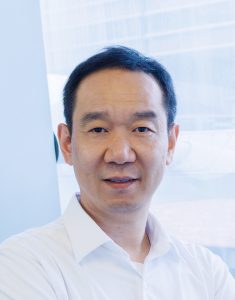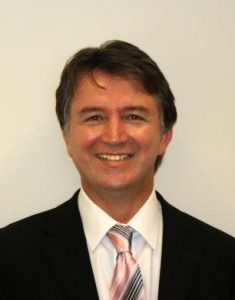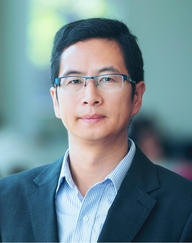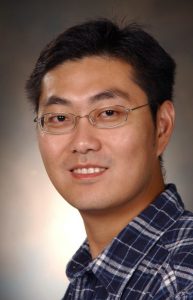 Prof. Song Guo
Prof. Song Guo
Bio:
Song Guo is a full professor in the Department of Computer Science and Engineering (CSE) at the Hong Kong University of Science and Technology (HKUST). Before joining HKUST in 2023, he was a Professor at The Hong Kong Polytechnic University. He also holds a Changjiang Chair Professorship in Wuhan University, awarded by the Ministry of Education of China.
His research interests are mainly in edge AI, 6G, big data and machine learning, mobile computing, and distributed systems. As a Highly Cited Researcher (Clarivate Web of Science), he published many papers in top venues with wide impact in these areas and received over a dozen Best Paper Awards from IEEE/ACM conferences, journals and technical committees, Gold Medal in 2023 Geneva Inventions Expo, Gold Award in 2023 AsiaWorld-Expo, and Intellectual Property Ambassador Award in 2020 Hong Kong Social Enterprise Competition.
Prof. Guo is a world-renowned leader who made fundamental and pioneering contributions to the development of novel edge intelligence architectures, algorithms, and systems over ubiquitous mobile, IoT, and wearable devices. His work on edge AI, cloud-edge computing, and resilient computing has created significant impact from generation of new scientific knowledge to creation of innovative technologies, as featured widely in prominent public media. He is a Fellow of the Canadian Academy of Engineering (FCAE), Member of Academia Europaea (MAE), Fellow of the IEEE (FIEEE), and Fellow of Asia-Pacific Artificial Intelligence Association (FAAIA).
Prof. Guo was an IEEE Communications Society (ComSoc) Distinguished Lecturer, a member of IEEE ComSoc Board of Governors, and the Chair of IEEE ComSoc Space and Satellite Communications Technical Committee. He has served on IEEE Fellow Evaluation Committee for both ComSoc and Computer Society. He is the founding and current Editor-in-Chief of IEEE Open Journal of the Computer Society and a member of Steering Committee of IEEE TCC. Prof. Guo has been named on editorial board of a number of prestigious international journals like IEEE TC, IEEE TPDS, IEEE TCC, IEEE TETC, IEEE TSUSC, ACM Computing Surveys, etc. He has also served as chair of organizing and technical committees of numerous IEEE/ACM conferences, workshops and symposia. He delivered more than 100 keynote addresses. He has served on RGC engineering panel and been frequently invited for various national and international grant/award reviews.
 Prof. Panos Nasiopoulos
Prof. Panos Nasiopoulos
Bio:
Professor Panos Nasiopoulos, Fellow of IEEE, Fellow of the Canadian Academy of Engineering, has been an active member of the Standards Council of Canada, MPEG, SMPTE and IEEE. He earned a Bachelor’s degree in physics from the Aristotle University of Thessaloniki, Greece, and his Bachelor’s, Master’s, and Ph.D. degrees in electrical and computer engineering from the University of British Columbia (UBC), Canada. He is a professor with the Department of Electrical and Computer Engineering and the former Director of the Institute for Computing, Information and Cognitive Systems and the Master of Software Systems at UBC. Before joining UBC, he was the President of Daikin Comtec US (co-founder of DVD) and Executive Vice President of Sonic Solutions. His research interests are primarily in the area of Digital Video Processing and Coding, he is the author or co-author of more than 250 research publications, and holds several patents. Dr. Nasiopoulos is a registered member of the Association of Professional Engineers and Geoscientists of British Columbia (APEGBC), Canada.
 Prof. F. Richard Yu
Prof. F. Richard Yu
Bio:
Professor F. Richard Yu, Fellow of the Canadian Academy of Engineering, the Engineering Institute of Canada, IEEE, and the Institution of Engineering and Technology (IET), Distinguished Speaker of IEEE, Board Member (2016-2022) and and Vice President (2017-2019) of the IEEE Vehicular Technology Society. He has been named in the Clarivate Analytics list of “Highly Cited Researchers” for four consecutive years (2019-present),and received several Best Paper Awards from some first-tier conferences. He has published over 700 papers. His work has been cited over 40,000 times on Google Scholar, with an H-index of 98. His research fields include autonomous machine intelligence, information networking, and blockchain. He serves as an editor for IEEE Comm. Surveys & Tutorials, IEEE Trans. Veh. Tech., and IEEE Trans. Green Comm.&Netw. His recent publication is a book titled “A Brief History of Intelligence”.
 Prof. Jiangchuan Liu
Prof. Jiangchuan Liu
Bio:
Jiangchuan Liu is currently a Full Professor (with University Professorship) in the School of Computing Science at Simon Fraser University, British Columbia, Canada. He is a Fellow of The Canadian Academy of Engineering, an IEEE Fellow, and an NSERC E.W.R. Steacie Memorial Fellow. He is also an EMC-Endowed Visiting Chair Professor of Tsinghua University, Beijing, China (2013-2016), an Adjunct Professor of Tsinghua Shenzhen Graduate School (2016-2017), and a Distinguished Guest Professor of Tsinghua Shenzhen International Graduate School (2022-2024). He was a Microsoft Research Fellow and worked at Microsoft Research Asia (MSRA) in the summers of 2000, 2001, 2002, 2007, and 2011. His research interests include Internet architecture and protocols, media streaming, wireless ad hoc networks, and service overlay networks. He serves as TPC member for various international conferences, including IEEE INFOCOM and IWQoS. He was Information System Co-Chair for IEEE INFOCOM’04, and a guest-editor for ACM/Kluwer Journal of Mobile Networks and Applications (MONET), Special Issue on Energy Constraints and Lifetime Performance in Wireless Sensor Networks. He is an editor of IEEE Communications Surveys and Tutorials. He is a member of IEEE and ACM, and an elected member of Sigma Xi.

